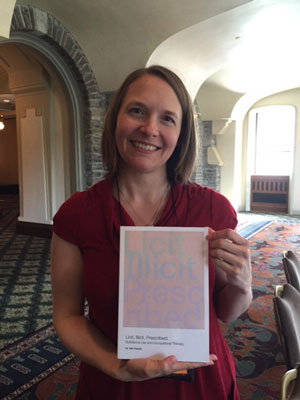News
» Go to news mainLicit, Illicit, Prescribed: Substance Use and Occupational Therapy
Valuable occupational therapy resource launched

The Canadian National Occupational Therapists’ annual conference in Banff, Alberta was the backdrop for the recent launch of Dr. Niki Kiepek’s new book, Licit, Illicit, Prescribed: Substance Use and Occupational Therapy. The book, reflective of over ten years of education, research and experience in the field, highlights the important role that can be played by occupational therapists.
There is significant variability in terms of who works in addiction services, which results in similar variability in the quality of the services provided. Through her experience, Niki noticed that most practitioners focused on supporting people to stop using substances, and on relapse prevention, but that little attention was directed toward helping people fill the gap with engagement in meaningful activity. Here, the role of occupational therapy became evident.
“Whether it’s eating healthy meals, getting more exercise, or returning to a job or school, you need to focus on meaningful life goals,” says Niki. “Maybe it’s fishing or being a leader in the community… but ‘success’ needs to be measured beyond the ‘use’ of a substance.”
As she began doing presentations to health care professionals regarding substance use interventions, she started to get many enquiries, and realized there were few resources for occupational therapists. That’s when she decided to write the book.
“I wanted to present the OT perspective,” Niki says, and with so many people asking for guidance, she thought it would be a more efficient way to respond. She also wanted to bring forward a more critical perspective, confronting myths and presenting diverse representations of varying patterns of substance use and their outcomes.
Licit, Illicit, Prescribed reflects “what we know so far” and provides a starting point for occupational therapists. Niki is hopeful that people will critique the work and share their own experiences, so it becomes a learning tool for all involved.
Learn More
- The School of OT and Niki plan to host a local launch of Licit, Illicit, Prescribed in September 2016. The book is available through the Canadian Association of Occupational Therapists.
- Niki, currently an Assistant Professor in the School of Occupational Therapy, has shared her expertise in the development of Dalhousie’s new Graduate Certificate in Mental Health and Addictions, an exciting new online program focused on better preparing health care professionals to support the health and well-being of people experiencing mental health, substance use and/or addiction issues.
- For Information about Niki’s ongoing program of research at Dalhousie, Understanding Substance Use: Performance and Experience.
Recent News
- Applications open for Leon & Rose Zitner Prize
- Practicing what we preach: The importance of leisure and recreation for those who study, teach and work in health
- Dal Health announces new Associate Dean, Equity and Inclusion
- New Director announced for College of Pharmacy
- PhD in Health candidate recognized for her innovation in cancer research
- Dal Health’s School of Nursing to offer Atlantic Canada’s First Master of Nursing, mental health and addictions
- Dr. Catherine Mah is taking aim at social impacts on food purchasing and diet
- Faculty of Health research project finds creative culmination in Nocturne 2023 exhibit
